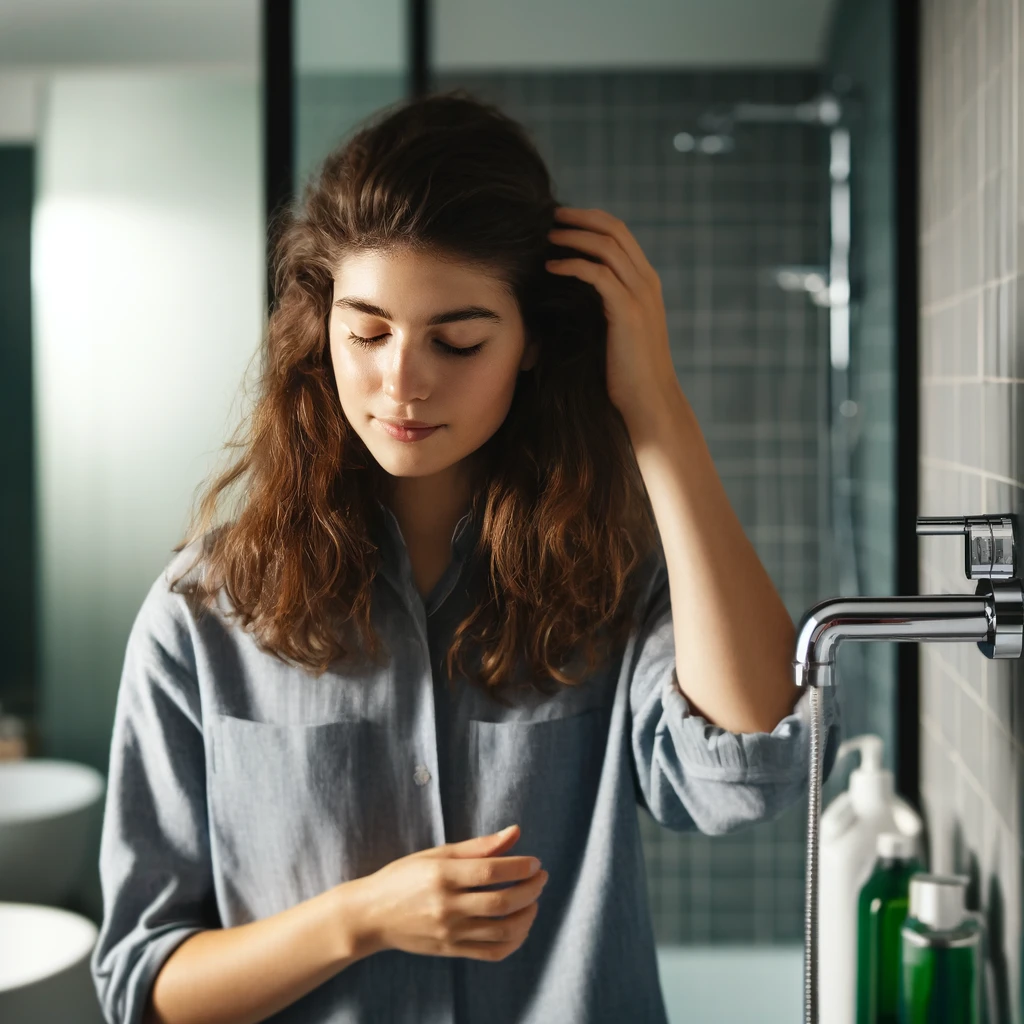Can You Use Conditioner Without Shampoo

In this article:
Yes, you can use conditioner without shampoo. Using conditioner without shampoo is known as co-washing.
In this method, you use conditioner to cleanse your hair, skipping the shampoo. This approach has gained popularity as a gentler alternative to traditional shampooing, especially for those with dry or curly hair types.
The Difference Between Shampoo And Conditioner
Shampoo and conditioner serve distinct purposes in haircare:
- Shampoo: Designed to clean the hair by removing dirt, oil, and product buildup. It contains surfactants that create a lather to lift impurities.
- Conditioner: Formulated to moisturize and nourish the hair. It contains oils, proteins, and vitamins to strengthen and protect the hair.
Co-wash, or conditioner washing, is a method of cleansing and conditioning using a single product instead of shampoo and conditioner separately, although some co-washers may occasionally use shampoo for a deeper clean and scalp restoration.

The Benefits of Using Conditioner Without Shampoo (Co-Washing)
Co-washing offers several benefits, especially for those with specific hair concerns:
- Protects your hair's natural oils: Unlike shampoo, which can strip away natural oils, conditioner helps maintain them, keeping your hair hydrated and healthy.
- Keeps your scalp hydrated: Conditioner provides moisture, preventing dryness and irritation.
- Can prevent hair breakage: Conditioners' moisturizing qualities help fortify hair strands, reducing the likelihood of breakage and split ends.
- Helps reduce frizz: It smooths the hair cuticle, reducing frizz and leaving your hair sleek and shiny.
- Helps recover severely dry or heat-damaged hair: The nourishing ingredients in the conditioner can help revive and repair damaged hair, restoring its health and vitality.
- Co-washing can save you time in the shower. It removes the need for separate shampoo and conditioner steps, streamlining your shower routine.
- You can extend the shelf life of your shampoo by using it less frequently. This will save you money in the long run.
The Side Effects of Co-Washing and How to Avoid Them
While co-washing can be beneficial for some, it may come with potential side effects:
- Scalp Buildup: Without shampoo's deep cleansing action, there's a risk of product buildup on the scalp, leading to greasiness and flakiness.
- Tip: Use a clarifying shampoo occasionally to cleanse the scalp and prevent buildup thoroughly.
- Oily Scalp: Some individuals may experience increased scalp oiliness, especially during adjustment.
- Tip: Give your scalp time to adjust to the new routine; the oiliness should subside after a week.
- Dry Ends: While conditioner moisturizes the hair, skipping shampoo altogether may lead to dryness at the ends of the hair.
- Tip: Ensure to apply conditioner thoroughly to the lengths and ends of the hair to prevent dryness.
- Hair Product Residue: Co-washing may not effectively remove all traces of hair products, potentially leading to weighed-down or dull-looking hair.
- Tip: Use a clarifying shampoo occasionally to remove any product residue and restore hair's natural shine.
Who Should Practice Co-Washing
Co-washing can be beneficial for certain hair types, including:
- Waves and Curls: Dry or naturally curly and wavy hair types can benefit from co-washing, which helps maintain moisture and enhances curl definition.
- Color-Processed Hair: Individuals with color-processed hair, provided they have a healthy scalp, can also practice co-washing to prolong the vibrancy of their color between salon visits.
However, there are hair types and conditions for which co-washing may not be suitable:
- Fine, Straight Hair: Co-washing may weigh down fine, straight hair, making it appear limp and greasy.
- Oily Scalp or Dermatitis: Those with an oily scalp or dermatitis should avoid co-washing as it may not effectively address these conditions. Stick to a traditional shampoo-then-condition routine to remove buildup and flakes effectively.
How Often Can You Use Conditioner Without Shampoo?
The optimal frequency for co-washing depends on various factors, including your hair type, scalp condition, and personal preferences:
- Frequency: Co-washing can be done every other day or a few times a week, depending on your hair's needs and how quickly it becomes oily.
- Gradual Introduction: When starting co-washing, it's essential to introduce it gradually into your haircare routine to allow your scalp and hair to adjust to the new method.
- Preference: Some individuals may find that co-washing works best for them when done less frequently, while others may benefit from more frequent co-washing sessions.

How to Use Conditioner Without Shampooing?
Follow these steps for proper conditioning without shampooing to achieve maximum effects and minimize damage:
- Wet Your Hair: Start by thoroughly wetting your hair in the shower, ensuring it's completely saturated.
- Apply Conditioner: Dispense a palmful of silicone-free conditioner into your hand and rub it into your scalp and the nearby hair. Repeat this process, applying more conditioner as needed until all of your hair is saturated with the conditioner.
- Pile Your Hair: Pile your hair on top of your head to keep it out of the shower stream. Consider using a shower cap to keep the conditioner from washing out.
- Let it Sit: Let the conditioner sit in your hair for a few minutes while you finish your shower routine.
- Scrub and Rinse: Add a splash of water, scrub your scalp again, and thoroughly rinse your hair to eliminate all conditioner.
- Dry and Style: Proceed to dry and style your hair normally. Let your hair air dry for optimal results, or use minimal heat styling.
- Recommended Products: Choose conditioners like Luxe Hydrate & Repair Conditioner for optimal results without weighing down your hair.
The Results
After co-washing for one week, your hair will feel softer and more manageable, with a subtle texture that holds styles well.
By the end of two weeks, your hair should continue to feel soft and look healthy, with reduced frizz and increased shine.
You may notice further improvements in your hair's texture and appearance at three weeks, with enhanced moisture and vibrancy.
By the end of one month, your hair should maintain its softness and texture while appearing healthier and more vibrant due to the maintenance of its natural oils.
Final Thoughts
In conclusion, co-washing can benefit your hair care routine, offering softer, more manageable hair with reduced frizz and increased shine.
Luxe Cosmetics provides a range of high-quality conditioners, such as the Luxe Hydrate & Repair Conditioner and Luxe Hair Growth Conditioner, perfect for maintaining healthy hair whether you co-wash or use traditional shampooing methods.
Final Thoughts
In summary, while dry shampoo can be a convenient quick fix for managing hair between washes, it's crucial to use it sparingly to avoid potential scalp irritation and buildup.
Our Luxe Hair Growth Shampoo promotes fuller, healthier hair growth, ideal for those looking to enhance their hair's natural growth. For added moisture and repair, the Luxe Hydrate & Repair Shampoo and Conditioner rejuvenates and restores dry, damaged hair.

Josef Mohamed
Josef Mohamed is a Content Marketer and Web Designer with over 6 years of experience.He brings a wealth of knowledge to his work, making him a reliable source for readers interested in practical insights about beauty.His writing style is straightforward, aiming to provide real facts and avoid common myths in the beauty industry.




